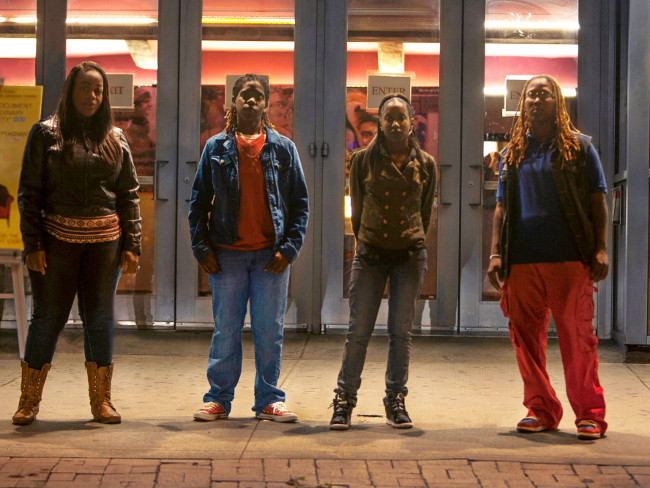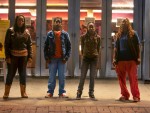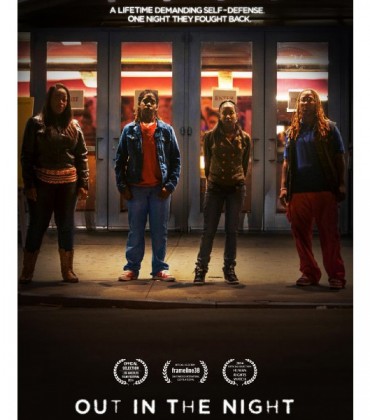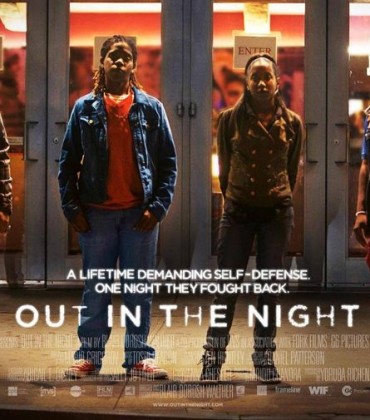
(from Out in the Night. Blair Dorosh-Walther.)
Out on Film, Atlanta’s LGBT film festival took place from October 2nd through 9th, showing a variety of films ranging from shorts that address transgender identity issues to sobering documentaries about spirituality and the policing of black queer lives. This year’s lineup included standout films, Black is Blue (directed Cheryl Dunye), Blackbird (Julian Walker, Mon’Nique), Out in the Night and Al Nisa: Black Muslim Women in Atlanta’s Gay Mecca (directed Red Summer). I had the chance to indulge in a little escapism where I watched the latter documentary films.
Out in the Night
Well-told documentaries have a way of inviting in their viewers like hospitable hosts welcoming a guest and the 75-minute documentary film directed by Blair Dorosh-Waltherb, does just that. The film tells the grim tale of four black queer women who were victims of a gay bashing incident in Manhattan’s West Village. In August of 2006, a young man approached a group of young women and proceeded to make sexual advances toward the ladies. The advances were struck down, igniting a series of unfortunate events in which the women had to fight off their attacker. Seven women were involved in the incident but what resulted for Patreese Johnson, Renata Hill, Venice Brown and Terrain Dandridge, also known as the “The New Jersey 4,” could be compared to a nightmarish game in a psychological thriller. The four young women were all charged with an extensive list of crimes and were ultimately sentenced to substantive prison terms. As the film’s creators state, “the film follows their journey to Rikers Island, the courtroom, and through slanderous media coverage.”
Through emotional telling and intimate cinematography, cameras invite us in on unforgettable journeys, a ride that’s often riddled with heartache and sobering scenes. Viewers also get an intimate take of the story from the perspective of two of the women involved, Renata Hill, a masculine identified, single mother, and Patreese Johnson, an artist with a demure temperament. The film also captures the experiences of the young ladies’ lawyers, a journalist, and several family members for those involved. Among other issues surrounding the harrowing ordeal, the documentary highlights Hill’s difficult separation from her young son and the struggles that Patreese Johnson and her family face as a result of her incarceration. For instance, the film shows the challenges that Johnson’s sister faces as she tries to support her by sending expensive packages and taking long commutes to visit her in jail. During the course behind bars, loved ones pass on and we see the often unspoken physiological effects that being confined triggers, issues such as post-traumatic stress.
Out in the Night is a splendid film that brilliantly highlights the incredible challenges these four women faced as a result of that fateful August night in 2006. The movie sheds light on many aspects of the women’s experience: the shortcomings of an unfair judicial system being “guilty” in the court of public opinion, and the challenges of navigating the prospect of being sentenced to jail, dealing with everyday familial struggles, all while struggling to find a voice as queer women of color. Despite the heavy subject matter throughout the film, the end result does offer viewers a beckon of hope. The cases were appealed and the sentences for all four women were eventually shortened. The last woman featured, Patreese Johnson, was released from prison in 2010. The film ends and shows the women’s quest to rebuild the broken pieces of their lives. The fight to regain custody of a child, rekindled familial relationships and love, yes love, the kind that heals scars and restores hope. Even though the women are all free from the confines of prison, the bigger systemic issues addressed in the film speak to the tri-fecta effect (black, woman, lesbian) . Throughout the film, viewers are exposed to some of the harsh realities that queer people of color often face. The film exposes the fact that our lives are unfairly policed and that we are not often times understood or humanized by mainstream society. This was especially evident in the unfair sentencing of the four women and the media’s portrayal of labeling these women a “lesbian wolf pack” and “lesbian gang.” As stated in the film, “you’re guilty by just having an identity,” and so was the case for the “Jersey 4.”
Al Nisa: Black Muslim Women in Atlanta’s Gay Mecca
Brought to you by Red Summer: Muslim, lesbian, mother, poet, writer, director; the list goes on. Al Nisa, (Arabic for “The Women”) intimately captures the lived experiences of a group of Muslim women living in Atlanta, the South’s black gay Mecca. Through a series of interviews and a communal meal, the ladies share their pains and triumphs with their search to marry, faith and sexual identity. At times painful, and with much candor, the documentary subjects answer questions such as what does it truly mean to be gay and Muslim? The Islamic code is indoctrinated as such that homosexuality and spirituality can’t coexist. The telling of such a powerful story comes at a crucial time as the Islamic world has seen a spike in the killings of gay men in the Middle East in the past year.
Red Summer beams with delight when expressing the moment when she found out she wasn’t the only Muslim lesbian around. When she met singer, activist, Meshell Ndegeocello, who embraced mother, queer, and Muslim, it was a reaffirmation of what she already knew to be true, “the identities can exist.” Shortly after, Summer went on a search to find others who were like her and she certainly found them in Atlanta. My greatest take away from this film was that I left wanting more. I wanted to know more about each of the film’s subjects. I wanted an in depth look into their day to day lives and how they practiced their faith. I wanted to know more about Islam. But for a graduate school endeavor the film did what it was supposed to, and it captured a sect of our community that isn’t often heard or seen.




[…] Back in October, we shared our thoughts on the feature “Out In The Night,” a documentary by filmmaker blair dorosh-walther, that chronicles “four women sensationalized by the media as a “Gang of Killer Lesbians.” The film “reveals the role that race, gender identity, and sexuality play in our criminal justice system.” Watch the film, in its entirety, and check out our review. […]